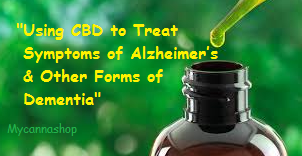The study reviewed 157 medical records, with the majority of patients were predominantly female (63.7%), aged 63.0 years, and from the Greater Sydney region (86.6%). Most patients were born in Australia (66.9%) , with 17.8% stating previous cannabis use and having neurological (58.0%) or musculoskeletal (24.8%) conditions.
Thursday, 6 April 2023
"The Effectivenes of Medicinal Cannabis in Adults with Non-Cancer Diagnoses"
Tuesday, 11 August 2020
"Using CBD to Treat the Symptoms of Alzheimer’s & Other Forms of Dementia"
Worldwide, 50 million people are living with Alzheimer's and other dementias.
Alzheimer’s disease is a degenerative brain disease and the most common form of dementia.
Dementia its an overall term that describes a group of symptoms.
Dementia is a general term for loss of memory, language, problem-solving and other thinking abilities that are severe enough to interfere with daily life. Alzheimer's is the most common cause of dementia.
The dementia-related conditions that can be helped by CBD include: Alzheimer’s disease, Vascular Dementia, Dementia with Lewy bodies (DLB), Parkinson’s disease, Frontotemporal dementia and Huntington’s disease.
According to researchers at California’s Salk Institute, their 2017 study has found evidence that cannabinoids such as CBD could help remove dementia from, and increase connections between, brain cells. Those results were validated by other laboratories.
There are three ways CBD can work to improve health outcomes for persons with dementia: by reducing inflammation, by reducing oxygen buildup, and by working as a brain stimulant and neuroprotectant. From a user’s perspective, CBD may reduce stress and anxiety in the individual with dementia as well as reduce the decline of memory and other brain functions.
Saturday, 27 July 2019
"Can CBD help With Neuroinflammation"
and microglia,the resident macrophages of the brain, are involved along with blood-borne cells.
Although in the past glial activation in neuroinflammation has been considered detrimental to the brain in general, currently the reparative/ protective aspects are being recognized.
Cannabinoids, whether plant derived or endogenous affect different glial functions.
Importantly, glial cells are endowed with several, if not all, of the elements of the endocannabinoid system, and therefore are sensitive to cannabinoids and at the same time are a source of endocannabinoids.
There appears to be general agreement that cannabinoids reduce the synthesis, production, and release of cytotoxic molecules such as proinflammatory cytokines and nitric oxide.
On the other hand, these agents modify microglial cell migration in such a way that the result is usually beneficial in resolving neuroinflammation or limiting ensuing neurodegeneration.



